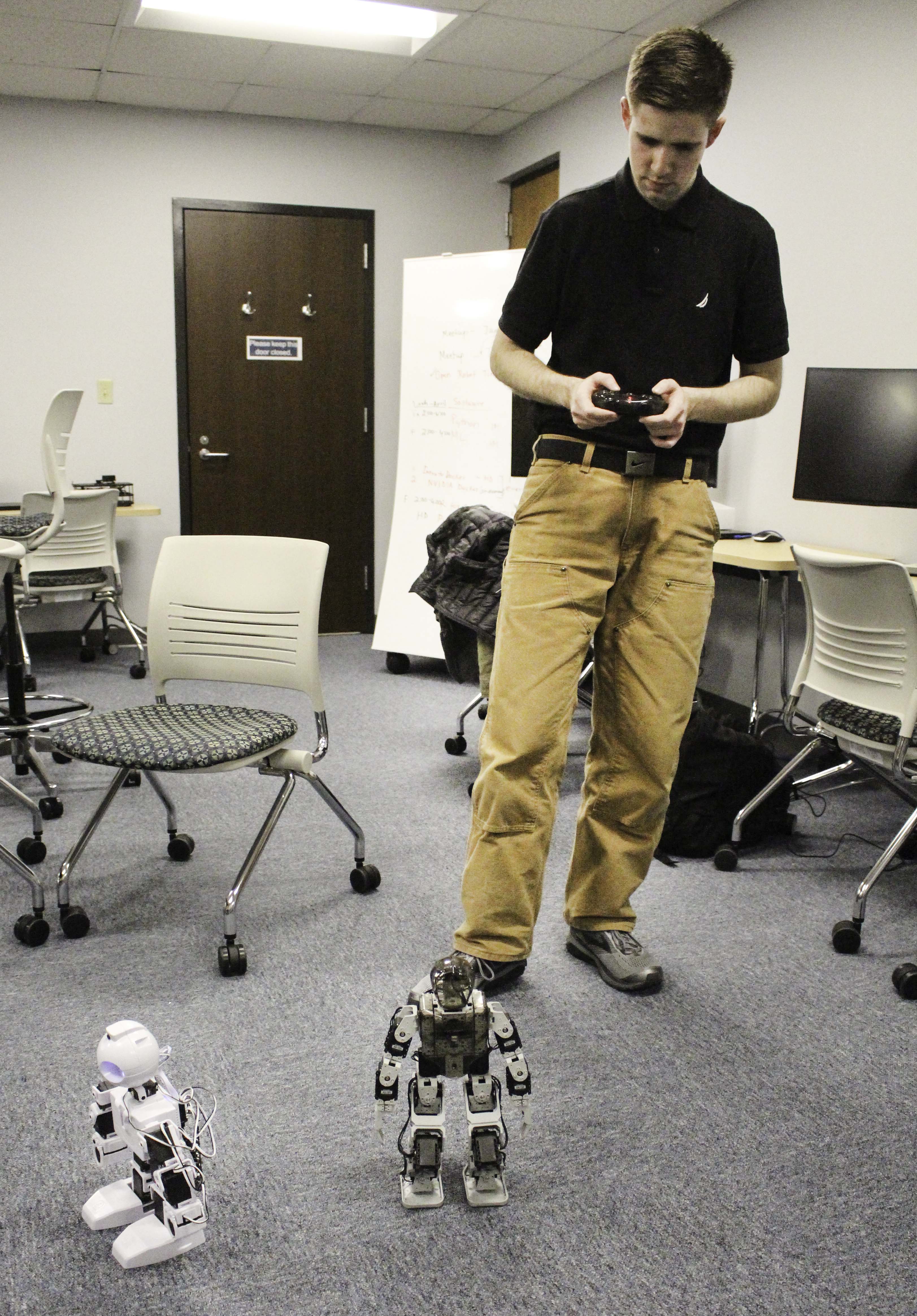Dan Brogan demonstrates one of the robots in the AI Lab that opened last semester. Photo by James McIntosh.
Dan Brogan, a junior mechanical engineering student and technology assistant for the University’s Artificial Intelligence Lab, slowly moves a red vase in front of a small, six-legged android. The robot, appropriately named “SIX” moves its sensor to watch the vase’s movement.
“You see, we programmed his sensor to track red,” Brogan said.
Almost like magic, when Brogan moves the vase to the left, SIX scurries towards it. When he moves it farther back, SIX crawls again. This color tracking technology is just one of the many things that the faculty and students involved in the lab’s Open Robot Time.
The University of Rhode Island Artificial Intelligence lab opened last fall, but Open Robot Time is one of the lab’s prime attractions. The lab is funded by both the University and the Champlain Foundation, a group that funds capital projects for various non-profit organizations in Rhode Island. The goal of the lab is to introduce the community to artificial intelligence as well as encourage them to explore the field.
“Our mission here is that no matter what person’s background, as long as they’re slightly interested, we want them to come in here and ask questions, so that we can sort of spread the word about AI and become more prepared for the future,” Brogan said.
Harrison Dekker, the AI lab’s interim director and a data librarian for URI’s library, comes from a data science background but is less experienced in artificial intelligence. However, many students such as Brogan work hands-on in coding the robots. In addition to the color tracking Brogan demonstrated, the robots can recognize faces, serve as Wi-Fi networks and even do movements such as walking or push-ups on command.
“I like learning from the students, just sitting down and talking with them about their projects,” Dekker said.
Philosophy Professor, Cheryl Foster, is not a computer scientist, but serves as a consultant in the AI lab. She believes that her experience in philosophy helps address the moral questions about artificial intelligence.
“My role in the AI lab is more to do with those kind of organizational and conceptual spaces, bring people together to explore the dimensions of big data and AI from a variety of perspectives,” Foster said.
Foster also hopes that Open Robot Time will foster discussion on the morality of artificial intelligence.
“A huge issue in both big data and AI is ethics,” Foster said. “That’s something I do have a strong background in. My involvement in the lab sort of began with overlap with questions like what are the unforeseen problems with ai in the workplace, privacy, etcetera.”
Karim Boughida, dean of University libraries, said that Open Robot Time is one of the best ways to promote AI literacy, or an understanding of artificial intelligence. He believes that this literacy is imperative for today’s students to understand for tomorrow’s society and jobs, even if they are in the humanities and social sciences.
“There’s this STEM barrier, where people think, ok this is for engineerings, but no,” Boughida said. “It’s for everyone. So try to tinker, try to play, it’s ok to play even for your own development.”
Dekker said that the lab also has more plans for community outreach. The Cranston Public Library, the Rhode Island Museum of Science and Art and a charter school have reached out to the lab. There are also plans to connect with URI students and faculty outside of Open Robot Time.
“We would like to develop a course that would be interdisciplinary for students of all levels to learn about AI and then to actually sort of apply it based on whatever their background is,” Dekker said.
Another plan for the AI lab is a monthly guest speaker. Dekker said that the first speaker will appear in March, and is one of the programmer’s behind Boston Dynamics’ Atlas robot. A video of Atlas doing a backflip went viral online in 2017.
Open Robot Time occurs on Mondays from 2:30 – 3:30 p.m.





